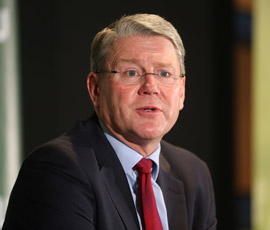EPIC: Peter Kendall sees bright future in poultry

The poultry sector needs to educate consumers about modern, intensive egg and poultrymeat production if it is to make the most of the opportunities that lie ahead.
Technical advances meant that, by 2050, it would be possible to attain a 2kg bird in just 19 days, while laying hens could be producing 500 eggs at 100 weeks, NFU president Peter Kendall told the Egg and Poultry Industry Conference.
But explaining the need for these developments tom consumers was the real challenge.
The industry was already burdened with excessive regulation and additional welfare costs compared with overseas producers, Mr Kendall explained. And that regulation existed because politicians, who changed jobs with startling regularity, were disproportionately influenced by consumer groups.
“Politicians often regulate on the back of what people say they want, rather than what they actually do – and you [the poultry sector] have to pick up the bill.”
Mr Kendall cited the example of the Welfare of Laying Hens Directive, which cost the egg industry £400m in investment into enriched cages. Yet government still based its public procurement policy on achieving minimum cost, something he described as “crass hypocrisy”.
So when it came to issues like getting planning permission for new sheds, having access to GM feeds or employing overseas labour, the poultry sector would have a better chance of success if it could explain to consumers why these things were necessary.
If this could be achieved, then Mr Kendall believed the egg and poultry sectors had a very positive future, driven by a rapidly expanding global population and a preference for poultry over all other meats.
The horsemeat scandal earlier this year had also presented a “fantastic opportunity” as supermarkets sought to shorten their supply chains and stock more British produce.
But Mr Kendall cautioned against over-expansion in the poultrymeat sector – as had happened with free-range eggs. There was a need to lay down more capacity, but without overfilling the supply chain.
Developing export markets and ensuring supermarkets stuck by their commitments were also part of the mix.
Tesco commercial director Derek Lawlor agreed producers needed to communicate better with consumers. He suggested using QR codes more, so that shoppers could scan a pack and find out about the product. “That should take you straight to the farm where it came from, with a two minute story describing the care and attention that has gone into producing that product.”
For a full report from this year’s EPIC, make sure you get the next issue of Poultry World
